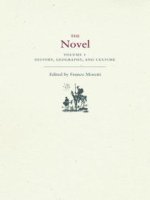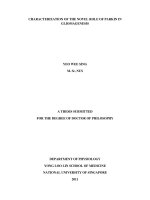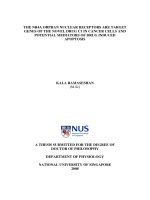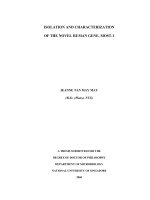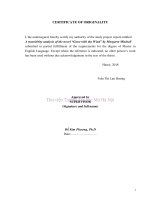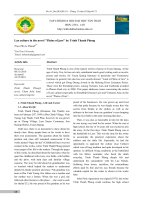the novel uarda
Bạn đang xem bản rút gọn của tài liệu. Xem và tải ngay bản đầy đủ của tài liệu tại đây (1.52 MB, 505 trang )
TheProjectGutenbergEBookUardabyGeorgEbers,Complete#11inour
seriesbyGeorgEbers
Copyrightlawsarechangingallovertheworld.Besuretocheckthecopyright
lawsforyourcountrybeforedownloadingorredistributingthisoranyother
ProjectGutenbergeBook.
ThisheadershouldbethefirstthingseenwhenviewingthisProjectGutenberg
file.Pleasedonotremoveit.Donotchangeoredittheheaderwithoutwritten
permission.
Pleasereadthe“legalsmallprint,”andotherinformationabouttheeBookand
ProjectGutenbergatthebottomofthisfile.Includedisimportantinformation
aboutyourspecificrightsandrestrictionsinhowthefilemaybeused.Youcan
alsofindoutabouthowtomakeadonationtoProjectGutenberg,andhowtoget
involved.
**WelcomeToTheWorldofFreePlainVanillaElectronicTexts**
**EBooksReadableByBothHumansandByComputers,Since1971**
*****TheseEBooksWerePreparedByThousandsofVolunteers*****
Title:Uarda,Complete
Author:GeorgEbers
ReleaseDate:April,2004[EBook#5449][Yes,wearemorethanoneyear
aheadofschedule][ThisfilewasfirstpostedonApril29,2002]
Edition:10
Language:English
Charactersetencoding:ASCII
***STARTOFTHEPROJECTGUTENBERGEBOOKUARDABYEBERS,
COMPLETE***
ThiseBookwasproducedbyDavidWidger<>
[NOTE:Thereisashortlistofbookmarks,orpointers,attheendofthefilefor
thosewhomaywishtosampletheauthor’sideasbeforemakinganentiremeal
ofthem.D.W.]
THEHISTORICALROMANCESOFGEORGEBERS,Complete
UARDA
AROMANCEOFANCIENTEGYPT
TranslatedfromtheGermanbyClaraBell
DEDICATION.
Thouknowestwellfromwhatthisbookarose.Whensufferingseizedandheld
meinitsclaspThyfosteringhandreleasedmefromitsgrasp,Andfromamid
thethornstherebloomedarose.Air,dew,andsunshinewerebestowedbyThee,
AndThineitis;withouttheselinesfromme.
PREFACE.
Inthewinterof1873IspentsomeweeksinoneofthetombsoftheNecropolis
ofThebesinordertostudythemonumentsofthatsolemncityofthedead;and
duringmylongridesinthesilentdesertthegermwasdevelopedwhencethis
bookhassincegrown.Theleisureofmindandbodyrequiredtowriteitwas
givenmethroughalongbutnotdisablingillness.
InthefirstinstanceIintendedtoelucidatethisstory—likemy“Egyptian
Princess”—withnumerousandextensivenotesplacedattheend;butIwasled
togiveupthisplanfromfindingthatitwouldleadmetotherepetitionofmuch
thatIhadwritteninthenotestothatearlierwork.
Thenumerousnotestotheformernovelhadathreefoldpurpose.Inthefirst
placetheyservedtoexplainthetext;inthesecondtheywereaguaranteeofthe
carewithwhichIhadstriventodepictthearchaeologicaldetailsinalltheir
individualityfromtherecordsofthemonumentsandofClassicAuthors;and
thirdlyIhopedtosupplythereaderwhodesiredfurtherknowledgeoftheperiod
withsomeguidetohisstudies.
InthepresentworkIshallventuretocontentmyselfwiththesimplestatement
thatIhaveintroducednothingaspropertoEgyptandtotheperiodofRameses
thatcannotbeprovedbysomeauthority;thenumerousmonumentswhichhave
descendedtousfromthetimeoftheRameses,infactenabletheenquirerto
understandmuchoftheaspectandarrangementofEgyptianlife,andtofollowit
steptrystepthroughthedetailsofreligious,public,andprivatelife,evenof
particularindividuals.Thesameremarkcannotbemadeinregardtotheirmental
life,andheremanyananachronismwillslipin,manythingswillappearmodern,
andshowthecoloringoftheChristianmodeofthought.
Everypartofthisbookisintelligiblewithouttheaidofnotes;but,forthereader
whoseeksforfurtherenlightenment,Ihaveaddedsomefoot-notes,andhavenot
neglectedtomentionsuchworksasaffordmoredetailedinformationonthe
subjectsmentionedinthenarrative.
Thereaderwhowishestofollowthemindoftheauthorinthisworkshouldnot
troublehimselfwiththenotesashereads,butmerelyatthebeginningofeach
chapterreadoverthenoteswhichbelongtotheforegoingone.Everyglanceat
thefoot-notesmustnecessarilydisturbandinjurethedevelopmentofthetaleas
aworkofart.Thestorystandshereasitflowedfromonefount,andwas
suppliedwithnotesonlyafteritscompletion.
AnarrativeofHerodotuscombinedwiththeEposofPentaur,ofwhichsomany
copieshavebeenhandeddowntous,formsthefoundationofthestory.
ThetreasonoftheRegentrelatedbytheFatherofhistoryisreferableperhapsto
thereignofthethirdandnotofthesecondRameses.Butitisbynomeans
certainthattheHalicarnassianwriterwasinthiscasemisinformed;andinthis
fictionnohistorywillbeinculcated,onlyasabackgroundshallIofferasketch
ofthetimeofSesostris,fromapicturesquepointofview,butwiththenearest
possibleapproachtotruth.Itistruethattothisendnothinghasbeenneglected
thatcouldbelearntfromthemonumentsorthepapyri;stillthebookisonlya
romance,apoeticfiction,inwhichIwishallthefactsderivedfromhistoryand
allthecostumedrawnfromthemonumentstoberegardedasincidental,andthe
emotionsoftheactorsinthestoryaswhatIattachimportanceto.
ButImustbeallowedtomakeoneobservation.Fromstudyingtheconventional
modeofexecutionofancientEgyptianart—whichwasstrictlysubjecttothe
hieraticlawsoftypeandproportion—wehaveaccustomedourselvestoimagine
theinhabitantsoftheNile-valleyinthetimeofthePharaohsastallandhaggard
menwithlittledistinctionofindividualphysiognomy,andrecentlyagreat
painterhassoughttorepresentthemunderthisaspectinamodernpicture.This
isanerror;theEgyptians,inspiteoftheiraversiontoforeignersandtheirstrong
attachmenttotheirnativesoil,wereoneofthemostintellectualandactive
peopleofantiquity;andhewhowouldrepresentthemastheylived,andtothat
endcopiestheformswhichremainpaintedonthewallsofthetemplesand
sepulchres,istheaccompliceofthosepriestlycorruptersofartwhocompelled
thepaintersandsculptorsofthePharaoniceratoabandontruthtonatureinfavor
oftheirsacredlawsofproportion.
HewhodesirestopainttheancientEgyptianswithtruthandfidelity,mustregard
itinsomesortasanactofenfranchisement;thatistosay,hemustreleasethe
conventionalformsfromthosefetterswhichwerepeculiartotheirartand
altogetherforeigntotheirreallife.Indeed,worksofsculptureremaintousofthe
timeofthefirstpyramid,whichrepresentmenwiththetruthofnature,
unfetteredbythesacredcanon.Wecanrecalltheso-called“VillageJudge”of
Bulaq,the“Scribe”nowinParis,andafewfiguresinbronzeindifferent
museums,aswellasthenobleandcharacteristicbustsofallepochs,which
amplyprovehowgreatthevarietyofindividualphysiognomy,and,withthat,of
individualcharacterwasamongtheEgyptians.AlmaTadelnainLondonand
GustavRichterinBerlinhave,aspainters,treatedEgyptiansubjectsinamanner
whichthepoetrecognizesandacceptswithdelight.
ManyearlierwitnessesthanthelatewriterFlaviusVopiscusmightbereferredto
whoshowustheEgyptiansasanindustriousandpeacefulpeople,passionately
devoteditistruetoallthatpertainstotheotherworld,butalsoenjoyingthegifts
oflifetothefullestextent,naysometimestoexcess.
Realmen,suchasweseearoundusinactuallife,notsilhouettesconstructedto
theoldpriestlyscalesuchasthemonumentsshowus—reallivingmendweltby
theoldNile-stream;andthepoetwhowouldrepresentthemmustcourageously
seizeontypesoutofthedailylifeofmodernmenthatsurroundhim,without
fearofdeviatingtoofarfromreality,and,placingthemintheirownlongpast
time,colorthemonlyandclothethemtocorrespondwithit.
IhavediscussedtheauthoritiesfortheconceptionoflovewhichIhaveascribed
totheancientsintheprefacetothesecondeditionof“AnEgyptianPrincess.”
WiththeselinesIsendUardaintotheworld;andinthemIaddmythanksto
thosedearfriendsinwhosebeautifulhome,emboweredingreen,bird-haunted
woods,Ihavesooftenrefreshedmyspiritandrecoveredmystrength,whereI
nowwritethelastwordsofthisbook.
Rheinbollerhutte,September22,1876.GEORGEBERS.
PREFACE
TOTHEFIFTHGERMANEDITION.
Theearliereditionsof“Uarda”werepublishedinsuchrapidsuccession,thatno
extensivechangesinthestereotypedtextcouldbemade;butfromthefirstissue,
Ihavenotceasedtocorrectit,andcannowpresenttothepublicthisnewfifth
editionasa“revised”one.
Havingfeltaconstantlyincreasingaffectionfor“Uarda”duringthetimeIwas
writing,thefriendlyandcomprehensiveattentionbestoweduponitbyour
greatestcriticsandthefavorablereceptionitmetwithinthevariousclassesof
society,affordedmetheutmostpleasure.
Iowethemostsinceregratitudetothehonoredgentlemen,whocalledmy
attentiontocertainerrors,andamongthemwillnameparticularlyProfessorPaul
AschersonofBerlin,andDr.C.RohrbachofGotha.Bothwillfindtheirremarks
regardingmistakesinthegeographicallocationofplants,heededinthisnew
edition.
Thenotes,aftermaturedeliberation,havebeenplacedatthefootofthepages
insteadofattheendofthebook.
Somanycriticismsconcerningthetitle“Uarda”haverecentlyreachedmyears,
that,ratherbywayofexplanationthanapology,IwillhererepeatwhatIsaidin
theprefacetothethirdedition.
Thistitlehasitsownhistory,andthemoredifficultitwouldbeformetodefend
it,themorereadyIamtoallowanadvocatetospeakforme,anadvocatewho
bearsanamenolessdistinguishedthanthatofG.E.Lessing,whosays:
“Nanine?(byVoltaire,1749).Whatsortoftitleisthat?Whatthoughtsdoesit
awake?Neithermorenorlessthanatitleshouldarouse.Atitlemustnotbeabill
offare.Thelessitbetraysofthecontents,thebetteritis.Authorandspectator
arebothsatisfied,andtheancientsrarelygavetheircomediesanythingbut
insignificantnames.”
Thismaybethecasewith“Uarda,”whosecharacterislessprominentthansome
others,itistrue,butwhosesorrowsdirectthedestiniesofmyotherheroesand
heroines.
WhyshouldIconcealthefact?Thecharacterof“Uarda”andthepresentstory
havegrownoutofthememoryofaFellahgirl,halfchild,halfmaiden,whomI
sawsufferanddieinahutatAbuelQurnahintheNecropolisofThebes.
IstillpersistintheconvictionIhavesofrequentlyexpressed,theconvictionthat
thefundamentaltraitsofthelifeofthesoulhaveundergoneverytrivial
modificationsamongcivilizednationsinalltimesandages,butwillendeavorto
explainthecontraryopinion,heldbymyopponents,bycallingattentiontothe
circumstance,thattheexpressionoftheseemotionsshowconsiderablevariations
amongdifferentpeoples,andatdifferentepochs.IbelievethatJuvenal,oneof
theancientwriterswhobestunderstoodhumannature,wasrightinsaying:
“Nileritulterius,quodnostrismoribusaddatPosteritas:eademcupient
facientqueminores.”
Leipsic,October15th,1877.
UARDA.
CHAPTERI.
BythewallsofThebes—theoldcityofahundredgates—theNilespreadstoa
broadriver;theheights,whichfollowthestreamonbothsides,heretakeamore
decidedoutline;solitary,almostcone-shapedpeaksstandoutsharplyfromthe
levelbackgroundofthemany-colored.limestonehills,onwhichnopalm-tree
flourishesandinwhichnohumbledesert-plantcanstrikeroot.Rockycrevasses
andgorgescutmoreorlessdeeplyintothemountainrange,anduptoitsridge
extendsthedesert,destructiveofalllife,withsandandstones,withrockycliffs
andreef-like,deserthills.
BehindtheeasternrangethedesertspreadstotheRedSea;behindthewesternit
stretcheswithoutlimit,intoinfinity.InthebeliefoftheEgyptiansbeyonditlay
theregionofthedead.
Betweenthesetworangesofhills,whichserveaswallsorrampartstokeepback
thedesert-sand,flowsthefreshandbounteousNile,bestowingblessingand
abundance;atoncethefatherandthecradleofmillionsofbeings.Oneachshore
spreadsthewideplainofblackandfruitfulsoil,andinthedepthsmany-shaped
creatures,incoatsofmailorscales,swarmandfindsubsistence.
Thelotosfloatsonthemirrorofthewaters,andamongthepapyrusreedsbythe
shorewater-fowlinnumerablebuildtheirnests.Betweentheriverandthe
mountain-rangeliefields,whichaftertheseed-timeareofashiningblue-green,
andtowardsthetimeofharvestglowlikegold.Nearthebrooksandwaterwheelshereandtherestandsashadysycamore;anddate-palms,carefully
tended,groupthemselvesingroves.Thefruitfulplain,wateredandmanured
everyyearbytheinundation,liesatthefootofthesandydesert-hillsbehindit,
andstandsoutlikeagardenflower-bedfromthegravel-path.
InthefourteenthcenturybeforeChrist—fortosoremoteadatewemustdirect
thethoughtsofthereader—impassablelimitshadbeensetbythehandofman,
inmanyplacesinThebes,totheinroadsofthewater;highdykesofstoneand
embankmentsprotectedthestreetsandsquares,thetemplesandthepalaces,
fromtheoverflow.
Canalsthatcouldbetightlyclosedupledfromthedykestothelandwithin,and
smallerbranch-cuttingstothegardensofThebes.
Ontheright,theeasternbankoftheNile,rosethebuildingsofthefar-famed
residenceofthePharaohs.Closebytheriverstoodtheimmenseandgaudy
TemplesofthecityofAmon;behindtheseandatashortdistancefromthe
Easternhills—indeedattheirveryfootandpartlyevenonthesoilofthedesert
—werethepalacesoftheKingandnobles,andtheshadystreetsinwhichthe
highnarrowhousesofthecitizensstoodincloserows.
LifewasgayandbusyinthestreetsofthecapitalofthePharaohs.
ThewesternshoreoftheNileshowedaquitedifferentscene.Heretootherewas
nolackofstatelybuildingsorthrongingmen;butwhileonthefarthersideofthe
rivertherewasacompactmassofhouses,andthecitizenswentcheerfullyand
openlyabouttheirday’swork,onthissidethereweresolitarysplendid
structures,roundwhichlittlehousesandhutsseemedtoclingaschildrenclingto
theprotectionofamother.Andthesebuildingslayindetachedgroups.
Anyoneclimbingthehillandlookingdownwouldformthenotionthattherelay
belowhimanumberofneighboringvillages,eachwithitslordlymanorhouse.
Lookingfromtheplainuptotheprecipiceofthewesternhills,hundredsof
closedportalscouldbeseen,somesolitary,otherscloselyrangedinrows;agreat
numberofthemtowardsthefootoftheslope,yetmorehalf-wayup,andafewat
aconsiderableheight.
Andevenmoredissimilarweretheslow-moving,solemngroupsintheroadways
onthisside,andthecheerful,confusedthrongyonder.There,ontheeastern
shore,allwereineagerpursuitoflabororrecreation,stirredbypleasureorby
grief,activeindeedandspeech;here,inthewest,littlewasspoken,aspell
seemedtocheckthefootstepofthewanderer,apalehandtosaddenthebright
glanceofeveryeye,andtobanishthesmilefromeverylip.
Andyetmanyagaily-dressedbarkstoppedattheshore,therewasnolackof
minstrelbands,grandprocessionspassedontothewesternheights;buttheNile
boatsborethedead,thesongssunghereweresongsoflamentation,andthe
processionsconsistedofmournersfollowingthesarcophagus.
WearestandingonthesoiloftheCityoftheDeadofThebes.
Neverthelessevenherenothingiswantingforreturnandrevival,fortothe
Egyptianhisdeaddiednot.Heclosedhiseyes,heborehimtotheNecropolis,to
thehouseoftheembalmer,orKolchytes,andthentothegrave;butheknewthat
thesoulsofthedepartedlivedon;thatthejustifiedabsorbedintoOsirisfloated
overtheHeavensinthevesseloftheSun;thattheyappearedonearthinthe
formtheychoosetotakeuponthem,andthattheymightexertinfluenceonthe
currentofthelivesofthesurvivors.Sohetookcaretogiveaworthyinterment
tohisdead,abovealltohavethebodyembalmedsoastoendurelong:andhad
fixedtimestobringfreshofferingsforthedeadoffleshandfowl,withdrinkofferingsandsweet-smellingessences,andvegetablesandflowers.
Neitherattheobsequiesnorattheofferingsmighttheministersofthegodsbe
absent,andthesilentCityoftheDeadwasregardedasafavoredsanctuaryin
whichtoestablishschoolsanddwellingsforthelearned.
SoitcametopassthatinthetemplesandonthesiteOftheNecropolis,large
communitiesofpriestsdwelttogether,andclosetotheextensiveembalming
houseslivednumerousKolchytes,whohandeddownthesecretsoftheirartfrom
fathertoson.
Besidesthesetherewereothermanufactoriesandshops.Intheformer,
sarcophagiofstoneandofwood,linenbandsforenvelopingmummies,and
amuletsfordecoratingthem,weremade;inthelatter,merchantskeptspicesand
essences,flowers,fruits,vegetablesandpastryforsale.Calves,gazelles,goats,
geeseandotherfowl,werefedonenclosedmeadow-plats,andthemourners
betookthemselvesthithertoselectwhattheyneededfromamongthebeasts
pronouncedbytheprieststobecleanforsacrifice,andtohavethemsealedwith
thesacredseal.Manyboughtonlypartofavictimattheshambles—thepoor
couldnotevendothis.Theyboughtonlycoloredcakesintheshapeofbeasts,
whichsymbolicallytooktheplaceofthecalvesandgeesewhichtheirmeans
wereunabletoprocure.Inthehandsomestshopssatservantsofthepriests,who
receivedformswrittenonrollsofpapyruswhichwerefilledupinthewriting
roomofthetemplewiththosesacredverseswhichthedepartedspiritmustknow
andrepeattowardofftheevilgeniusofthedeep,toopenthegateoftheunder
world,andtobeheldrighteousbeforeOsirisandtheforty-twoassessorsofthe
subterraneancourtofjustice.
Whattookplacewithinthetempleswasconcealedfromview,foreachwas
surroundedbyahighenclosingwallwithlofty,carefully-closedportals,which
wereonlyopenedwhenachorusofpriestscameouttosingapioushymn,inthe
morningtoHorustherisinggod,andintheeveningtoTumthedescendinggod.
[ThecourseoftheSunwascomparedtothatofthelifeofMan.Heroseasthe
childHorns,grewbymiddaytotheheroRa,whoconqueredtheUraeussnake
forhisdiadem,andbyeveningwasanoldMan,Tum.Lighthadbeenbornof
darkness,henceTumwasregardedasolderthanHornsandtheothergodsof
light.]
Assoonastheeveninghymnofthepriestswasheard,theNecropoliswas
deserted,forthemournersandthosewhowerevisitingthegraveswererequired
bythistimetoreturntotheirboatsandtoquittheCityoftheDead.Crowdsof
menwhohadmarchedintheprocessionsofthewestbankhastenedindisorder
totheshore,drivenonbythebodyofwatchmenwhotookitinturnstodothis
dutyandtoprotectthegravesagainstrobbers.Themerchantsclosedtheir
booths,theembalmersandworkmenendedtheirday’sworkandretiredtotheir
houses,thepriestsreturnedtothetemples,andtheinnswerefilledwithguests,
whohadcomehitheronlongpilgrimagesfromadistance,andwhopreferred
passingthenightinthevicinityofthedeadwhomtheyhadcometovisit,to
goingacrosstothebustlingnoisycityfarthershore.
Thevoicesofthesingersandofthewailingwomenwerehushed,eventhesong
ofthesailorsonthenumberlessferryboatsfromthewesternshoretoThebes
diedaway,itsfaintechowasnowandthenborneacrossontheeveningair,and
atlastallwasstill.
AcloudlessskyspreadoverthesilentCityoftheDead,nowandthendarkened
foraninstantbytheswiftlypassingshadeofabatreturningtoitshomeinacave
orcleftoftherockafterflyingthewholeeveningneartheNiletocatchflies,to
drink,andsoprepareitselfforthenextday’ssleep.Fromtimetotimeblack
formswithlongshadowsglidedoverthestillilluminatedplain—thejackals,
whoatthishourfrequentedtheshoretoslaketheirthirst,andoftenfearlessly
showedthemselvesintroopsinthevicinityofthepensofgeeseandgoats.
Itwasforbiddentohunttheserobbers,astheywereaccountedsacredtothegod
Anubis,thetutelaryofsepulchres;andindeedtheydidlittlemischief,forthey
foundabundantfoodinthetombs.
[Thejackal-headedgodAnubiswasthesonofOsirisandNephthys,andthe
jackalwassacredtohim.Intheearliestagesevenheisprominentinthenether
world.Heconductsthemummifyingprocess,preservesthecorpse,guardsthe
Necropolis,and,asHermesPsychopompos(Hermanubis),opensthewayforthe
souls.AccordingtoPlutarch“Heisthewatchofthegodsasthedogisthewatch
ofmen.”]
Theremnantsofthemeatofferingsfromthealtarswereconsumedbythem;to
theperfectsatisfactionofthedevotees,who,whentheyfoundthatbythe
followingdaythemeathaddisappeared,believedthatithadbeenacceptedand
takenawaybythespiritsoftheunderworld.
Theyalsodidthedutyoftrustywatchers,fortheywereadangerousfoeforany
intruderwho,undertheshadowofthenight,mightattempttoviolateagrave.
Thus—onthatsummereveningoftheyear1352B.C.,whenweinvitethereader
toaccompanyustotheNecropolisofThebes—afterthepriests’hymnhaddied
away,allwasstillintheCityoftheDead.
Thesoldiersonguardwerealreadyreturningfromtheirfirstroundwhen
suddenly,onthenorthsideoftheNecropolis,adogbarkedloudly;soona
secondtookupthecry,athird,afourth.Thecaptainofthewatchcalledtohis
mentohalt,and,asthecryofthedogsspreadandgrewloudereveryminute,
commandedthemtomarchtowardsthenorth.
Thelittletroophadreachedthehighdykewhichdividedthewestbankofthe
Nilefromabranchcanal,andlookedfromthenceovertheplainasfarasthe
riverandtothenorthoftheNecropolis.Oncemorethewordto“halt”was
given,andastheguardperceivedtheglareoftorchesinthedirectionwherethe
dogswerebarkingloudest,theyhurriedforwardandcameupwiththeauthorof
thedisturbancenearthePylonofthetempleerectedbySetiI.,thedeceased
fatherofthereigningKingRamesesII.
[Thetwopyramidaltowersjoinedbyagatewaywhichformedtheentranceto
anEgyptiantemplewerecalledthePylon.]
Themoonwasup,andherpalelightfloodedthestatelystructure,whilethe
wallsglowedwiththeruddysmokylightofthetorcheswhichflaredinthehands
ofblackattendants.
Amanofsturdybuild,insumptuousdress,wasknockingatthebrass-covered
templedoorwiththemetalhandleofawhip,soviolentlythattheblowsrangfar
andloudthroughthenight.Nearhimstoodalitter,andachariot,towhichwere
harnessedtwofinehorses.Inthelittersatayoungwoman,andinthecarriage,
nexttothedriver,wasthetallfigureofalady.Severalmenoftheupperclasses
andmanyservantsstoodaroundthelitterandthechariot.Fewwordswere
exchanged;thewholeattentionofthestrangelylightedgroupsseemed
concentratedonthetemple-gate.Thedarknessconcealedthefeaturesof
individuals,butthemingledlightofthemoonandthetorcheswasenoughto
revealtothegatekeeper,wholookeddownonthepartyfromatowerofthe
Pylon,thatitwascomposedofpersonsofthehighestrank;nay,perhapsofthe
royalfamily.
Hecalledaloudtotheonewhoknocked,andaskedhimwhatwashiswill.
Helookedup,andinavoicesoroughandimperious,thattheladyinthelitter
shrankinhorrorasitstonessuddenlyviolatedtheplaceofthedead,hecriedout
—“Howlongarewetowaithereforyou—youdirtyhound?Comedownand
openthedoorandthenaskquestions.Ifthetorch-lightisnotbrightenoughto
showyouwhoiswaiting,Iwillscoreournameonyourshoulderswithmywhip,
andteachyouhowtoreceiveprincelyvisitors.”
Whiletheportermutteredanunintelligibleanswerandcamedownthesteps
withintoopenthedoor,theladyinthechariotturnedtoherimpatient
companionandsaidinapleasantbutyetdecidedvoice,“Youforget,Paaker,that
youarebackagaininEgypt,andthathereyouhavetodealnotwiththewild
Schasu,—[ASemiticraceofrobbersinthecastofEgypt.]—butwithfriendly
priestsofwhomwehavetosolicitafavor.Wehavealwayshadtolamentyour
roughness,whichseemstomeveryill-suitedtotheunusualcircumstancesunder
whichweapproachthissanctuary.”
Althoughthesewordswerespokeninatoneratherofregretthanofblame,they
woundedthesensibilitiesofthepersonaddressed;hiswidenostrilsbeganto
twitchominously,heclenchedhisrighthandoverthehandleofhiswhip,and,
whileheseemedtobebowinghumbly,hestrucksuchaheavyblowonthebare
legofaslavewhowasstandingneartohim,anoldEthiopian,thatheshuddered
asiffromsuddencold,though-knowinghislordonlytoowell—heletnocryof
painescapehim.Meanwhilethegatekeeperhadopenedthedoor,andwithhima
tallyoungprieststeppedoutintotheopenairtoaskthewilloftheintruders.
Paakerwouldhaveseizedtheopportunityofspeaking,buttheladyinthechariot
interposedandsaid:
“IamBent-Anat,thedaughteroftheKing,andthisladyinthelitterisNefert,
thewifeofthenobleMena,thecharioteerofmyfather.Weweregoingin
companywiththesegentlementothenorthwestvalleyoftheNecropolistosee
thenewworksthere.Youknowthenarrowpassintherockswhichleadsupthe
gorge.OnthewayhomeImyselfheldthereinsandIhadthemisfortunetodrive
overagirlwhosatbytheroadwithabasketfullofflowers,andtohurther—to
hurtherverybadlyIamafraid.ThewifeofMenawithherownhandsboundup
thechild,andthenshecarriedhertoherfather’shouse—heisaparaschites—
[Onewhoopenedthebodiesofthedeadtopreparethemforbeingembalmed.]
—Pinemishisname.Iknownotwhetherheisknowntoyou.”
“Thouhastbeenintohishouse,Princess?”
“Indeed,Iwasobliged,holyfather,”shereplied,“IknowofcoursethatIhave
defiledmyselfbycrossingthethresholdofthesepeople,but—”
“But,”criedthewifeofMena,raisingherselfinherlitter,“Bent-Anatcanina
daybepurifiedbytheeorbyherhouse-priest,whileshecanhardly—orperhaps
never—restorethechildwholeandsoundagaintotheunhappyfather.”
“Still,thedenofaparaschitesisaboveeverythingunclean,”saidthe
chamberlainPenbesa,masteroftheceremoniestotheprincess,interruptingthe
wifeofMena,“andIdidnotconcealmyopinionwhenBent-Anatannouncedher
intentionofvisitingtheaccursedholeinperson.Isuggested,”hecontinued,
turningtothepriest,“thatsheshouldletthegirlbetakenhome,andsendaroyal
presenttothefather.”
“Andtheprincess?”askedthepriest.
“Sheacted,asshealwaysdoes,onherownjudgment,”repliedthemasterofthe
ceremonies.
“Andthatalwayshitsontherightcourse,”criedthewifeofMena.
“WouldtoGoditwereso!”saidtheprincessinasubduedvoice.Thenshe
continued,addressingthepriest,“ThouknowestthewilloftheGodsandthe
heartsofmen,holyfather,andImyselfknowthatIgivealmswillinglyandhelp
thepoorevenwhenthereisnonetopleadforthembuttheirpoverty.Butafter
whathasoccurredhere,andtotheseunhappypeople,itisIwhocomeasa
suppliant.”
“Thou?”saidthechamberlain.
“I,”answeredtheprincesswithdecision.Thepriestwhouptothismomenthad
remainedasilentwitnessofthesceneraisedhisrighthandasinblessingand
spoke.
“Thouhastdonewell.TheHathorsfashionedthyheartandtheLadyofTruth
guidesit.Thouhastbrokeninonournight-prayerstorequestustosendadoctor
totheinjuredgirl?”
[HathorwasIsisunderasubstantialform.Sheisthegoddessofthepure,light
heaven,andbearstheSun-diskbetweencow-hornsonacow’sheadorona
humanheadwithcow’sears.ShewasnamedtheFair,andallthepurejoysof
lifeareinhergift.LatershewasregardedasaMusewhobeautifieslifewith
enjoyment,love,song,andthedance.Sheappearsasagoodfairybythecradle
ofchildrenanddecidestheirlotinlife.Shebearsmanynames:andseveral,
generallyseven,Hathorswererepresented,whopersonifiedtheattributesand
influenceofthegoddess.]
“Thouhastsaid.”
“Iwillaskthehighpriesttosendthebestleechforoutwardwoundsimmediately
tothechild.ButwhereisthehouseoftheparaschitesPinem?Idonotknowit.”
“NorthwardsfromtheterraceofHatasu,—[Agreatqueenofthe18thdynasty
andguardianoftwoPharaohs]—closeto—;butIwillchargeoneofmy
attendantstoconducttheleech.Besides,Iwanttoknowearlyinthemorning
howthechildisdoing.—Paaker.”
Theroughvisitor,whomwealreadyknow,thuscalledupon,bowedtotheearth,
hisarmshangingbyhissides,andasked:
“Whatdostthoucommand?”
“Iappointyouguidetothephysician,”saidtheprincess.“Itwillbeeasytothe
king’spioneertofindthelittlehalf-hiddenhouseagain—
[Thetitlehererenderedpioneerwasthatofanofficerwhosedutieswerethose
atonceofascoutandofaQuarter-MasterGeneral.Inunknownand
comparativelysavagecountriesitwasanonerouspost.—Translator.]
besides,yousharemyguilt,for,”sheadded,turningtothepriest,“Iconfessthat
themisfortunehappenedbecauseIwouldtrywithmyhorsestoovertake
Paaker’sSyrianracers,whichhedeclaredtobeswifterthantheEgyptianhorses.
Itwasamadrace.”
“AndAmonbepraisedthatitendedasitdid,”exclaimedthemasterofthe
ceremonies.“Packer’schariotliesdashedinpiecesinthevalley,andhisbest
horseisbadlyhurt.”
“Hewillseetohimwhenhehastakenthephysiciantothehouseofthe
paraschites,”saidtheprincess.“Dostthouknow,Penbesa—thouanxious
guardianofathoughtlessgirl—thatto-dayforthefirsttimeIamgladthatmy
fatherisatthewarindistantSatiland?”—[Asia].
“Hewouldnothavewelcomeduskindly!”saidthemasteroftheceremonies,
laughing.
“Buttheleech,theleech!”criedBent-Anat.“Packer,itissettledthen.Youwill
conducthim,andbringustomorrowmorningnewsofthewoundedgirl.”
Paakerbowed;theprincessbowedherhead;thepriestandhiscompanions,who
meanwhilehadcomeoutofthetempleandjoinedhim,raisedtheirhandsin
blessing,andthebelatedprocessionmovedtowardstheNile.
Paakerremainedalonewithhistwoslaves;thecommissionwithwhichthe
princesshadchargedhimgreatlydispleasedhim.Solongasthemoonlight
enabledhimtodistinguishthelitterofMena’swife,hegazedafterit;thenhe
endeavoredtorecollectthepositionofthehutoftheparaschites.Thecaptainof
thewatchstillstoodwiththeguardatthegateofthetemple.
“DoyouknowthedwellingofPinemtheparaschites?”askedPaaker.
“Whatdoyouwantwithhim?”
“Thatisnoconcernofyours,”retortedPaaker.
“Lout!”exclaimedthecaptain,“leftfaceandforwards,mymen.”
“Halt!”criedPaakerinarage.“Iamtheking’schiefpioneer.”
“Thenyouwillallthemoreeasilyfindthewaybackbywhichyoucame.
March.”
Thewordswerefollowedbyapealofmany-voicedlaughter:there-echoing
insultsoconfoundedPaakerthathedroppedhiswhipontheground.Theslave,
whomashorttimesincehehadstruckwithit,humblypickeditupandthen
followedhislordintotheforecourtofthetemple.Bothattributedthetitter,
whichtheystillcouldhearwithoutbeingabletodetectitsorigin,towandering
spirits.Butthemockingtoneshadbeenheardtoobytheoldgatekeeper,andthe
laugherswerebetterknowntohimthantotheking’spioneer;hestrodewith
heavystepstothedoorofthetemplethroughtheblackshadowofthepylon,and
strikingblindlybeforehimcalledout—
“Ah!yougood-for-nothingbroodofSeth.
[TheTyphonoftheGreeks.TheenemyofOsiris,oftruth,goodandpurity.
Discordandstrifeinnature.HornswhofightsagainsthimforhisfatherOsiris,
canthrowhimandstunhim,butneverannihilatehim.]
“Yougallows-birdsandbroodofhell—Iamcoming.”
Thegigglingceased;afewyouthfulfiguresappearedinthemoonlight,theold
manpursuedthempanting,and,afterashortchase,atroopofyouthsfledback
throughthetemplegate.
Thedoorkeeperhadsucceededincatchingonemiscreant,aboyofthirteen,and
heldhimsotightbytheearthathisprettyheadseemedtohavegrownina
horizontaldirectionfromhisshoulders.
“Iwilltakeyoubeforetheschool-master,youplague-of-locusts,youswarmof
bats!”criedtheoldmanoutofbreath.Butthedozenofschool-boys,whohad
availedthemselvesoftheopportunitytobreakoutofbounds,gatheredcoaxing
roundhim,withwordsofrepentance,thougheveryeyesparkledwithdelightat
thefuntheyhadhad,andofwhichnoonecoulddeprivethem;andwhenthe
biggestofthemtooktheoldman’schin,andpromisedtogivehimthewine
whichhismotherwastosendhimnextdayfortheweek’suse,theporterletgo
hisprisoner—whotriedtorubthepainoutofhisburningear—andcriedoutin
harshertonesthanbefore:
“Youwillpayme,willyou,toletyouoff!DoyouthinkIwillletyourtricks
pass?Youlittleknowthisoldman.IwillcomplaintotheGods,nottothe
school-master;andasforyourwine,youngster,Iwillofferitasalibation,that
heavenmayforgiveyou.”
CHAPTERII.
Thetemplewhere,intheforecourt,Paakerwaswaiting,andwherethepriesthad
disappearedtocalltheleech,wascalledthe“HouseofSeti”—[Itisstill
standingandknownasthetempleofQurnah.]—andwasoneofthelargestinthe
CityoftheDead.Onlythatmagnificentbuildingofthetimeofthedeposedroyal
raceofthereigningking’sgrandfather—thattemplewhichhadbeenfoundedby
ThotmesIII.,andwhosegatewayAmenophisIII.hadadornedwithimmense
colossalstatues—[Thatwhichstandstothenorthisthefamousmusicalstatue,
orPillarofMemmon]—exceededitintheextentofitsplan;ineveryother
respectitheldthepre-eminenceamongthesanctuariesoftheNecropolis.
RamesesI.hadfoundeditshortlyafterhesucceededinseizingtheEgyptian
throne;andhisyetgreatersonSeticarriedontheerection,inwhichtheservice
ofthedeadfortheManesofthemembersofthenewroyalfamilywas
conducted,andthehighfestivalsheldinhonoroftheGodsoftheunderworld.
Greatsumshadbeenexpendedforitsestablishment,forthemaintenanceofthe
priesthoodofitssanctuary,andthesupportoftheinstitutionsconnectedwithit.
Thesewereintendedtobeequaltothegreatoriginalfoundationsofpriestly
learningatHeliopolisandMemphis;theywereregulatedonthesamepattern,
andwiththeobjectofraisingthenewroyalresidenceofUpperEgypt,namely
Thebes,abovethecapitalsofLowerEgyptinregardtophilosophicaldistinction.
Oneofthemostimportantofthesefoundationswasaverycelebratedschoolof
learning.
[EverydetailofthisdescriptionofanEgyptianschoolisderivedfromsources
datingfromthereignofRamesesII.andhissuccessor,Merneptah.]
Firsttherewasthehigh-school,inwhichpriests,physicians,judges,
mathematicians,astronomers,grammarians,andotherlearnedmen,notonlyhad
thebenefitofinstruction,but,subsequently,whentheyhadwonadmissiontothe
highestranksoflearning,andattainedthedignityof“Scribes,”weremaintained
atthecostoftheking,andenabledtopursuetheirphilosophicalspeculationsand
researches,infreedomfromallcare,andinthesocietyoffellow-workersof
equalbirthandidenticalinterests.
Anextensivelibrary,inwhichthousandsofpapyrus-rollswerepreserved,andto
whichamanufactoryofpapyruswasattached,wasatthedisposalofthelearned;
andsomeofthemwereintrustedwiththeeducationoftheyoungerdisciples,
whohadbeenpreparedintheelementaryschool,whichwasalsodependenton
theHouse—oruniversity—ofSeti.Thelowerschoolwasopentoeverysonofa
freecitizen,andwasoftenfrequentedbyseveralhundredboys,whoalsofound
night-quartersthere.Theparentswereofcourserequiredeithertopayfortheir
maintenance,ortosendduesuppliesofprovisionsforthekeepoftheirchildren
atschool.
Inaseparatebuildinglivedthetemple-boarders,afewsonsofthenoblest
families,whowerebroughtupbythepriestsatagreatexpensetotheirparents.
SetiI.,thefounderofthisestablishment,hadhadhisownsons,notexcepting
Rameses,hissuccessor,educatedhere.
Theelementaryschoolswerestrictlyruled,andtherodplayedsolargeapartin
them,thatapedagoguecouldrecordthissaying:“Thescholar’searsareathis
back:whenheisfloggedthenhehears.”
Thoseyouthswhowishedtopassupfromthelowertothehigh-schoolhadto
undergoanexamination.Thestudent,whenhehadpassedit,couldchoosea
masterfromamongthelearnedofthehighergrades,whoundertooktobehis
philosophicalguide,andtowhomheremainedattachedallhislifethrough,asa
clienttohispatron.Hecouldobtainthedegreeof“Scribe”andqualifyforpublic
officebyasecondexamination.
Neartotheseschoolsoflearningtherestoodalsoaschoolofart,inwhich
instructionwasgiventostudentswhodesiredtodevotethemselvesto
architecture,sculpture,orpainting;inthesealsothelearnermightchoosehis
master.
EveryteacherintheseinstitutionsbelongedtothepriesthoodoftheHouseof
Seti.Itconsistedofmorethaneighthundredmembers,dividedintofiveclasses,
andconductedbythreeso-calledProphets.
ThefirstprophetwasthehighpriestoftheHouseofSeti,andatthesametime
thesuperiorofallthethousandsofupperandunderservantsofthedivinities
whichbelongedtotheCityoftheDeadofThebes.
ThetempleofSetiproperwasamassivestructureoflimestone.Arowof
SphinxesledfromtheNiletothesurroundingwall,andtothefirstvastpropylon,whichformedtheentrancetoabroadforecourt,enclosedonthetwosides
bycolonnades,andbeyondwhichstoodasecondgateway.Whenhehadpassed
throughthisdoor,whichstoodbetweentwotowers,inshapeliketruncated
pyramids,thestrangercametoasecondcourtresemblingthefirst,closedatthe
fartherendbyanoblerowofpillars,whichformedpartofthecentraltemple
itself.
Theinnermostandlastwasdimlylightedbyafewlamps.
BehindthetempleofSetistoodlargesquarestructuresofbrickoftheNilemud,
whichhoweverhadahandsomeanddecorativeeffect,asthehumblematerialof
whichtheywereconstructedwasplasteredwithlime,andthatagainwaspainted
withcoloredpicturesandhieroglyphicinscriptions.
Theinternalarrangementofallthesehouseswasthesame.Inthemidstwasan
opencourt,ontowhichopenedthedoorsoftheroomsofthepriestsand
philosophers.Oneachsideofthecourtwasashady,coveredcolonnadeofwood,
andinthemidstatankwithornamentalplants.Intheupperstorywerethe
apartmentsforthescholars,andinstructionwasusuallygiveninthepaved
courtyardstrewnwithmats.
Themostimposingwasthehouseofthechiefprophets;itwasdistinguishedby
itswavingstandardsandstoodaboutahundredpacesbehindthetempleofSeti,
betweenawellkeptgroveandaclearlake—thesacredtankofthetemple;but
theyonlyoccupieditwhilefulfillingtheiroffice,whilethesplendidhouses
whichtheylivedinwiththeirwivesandchildren,layontheothersideofthe
river,inThebesproper.
Theuntimelyvisittothetemplecouldnotremainunobservedbythecolonyof
sages.Justasantswhenahandbreaksinontheirdwelling,hurryrestlessly
hitherandthither,soanunwontedstirhadagitated,nottheschool-boysonly,but
theteachersandthepriests.Theycollectedingroupsneartheouterwalls,asking
questionsandhazardingguesses.Amessengerfromthekinghadarrived—the
princessBent-AnathadbeenattackedbytheKolchytes—andawagamongthe
school-boyswhohadgotout,declaredthatPaaker,theking’spioneer,hadbeen
broughtintothetemplebyforcetobemadetolearntowritebetter.Asthe
subjectofthejokehadformerlybeenapupiloftheHouseofSeti,andmany
delectablestoriesofhiserrorsinpenmanshipstillsurvivedinthememoryofthe
latergenerationofscholars,thisinformationwasreceivedwithjoyfulapplause;
anditseemedtohaveaglimmerofprobability,inspiteoftheapparent
contradictionthatPaakerfilledoneofthehighestofficesneartheking,whena
graveyoungpriestdeclaredthathehadseenthepioneerintheforecourtofthe
temple.
Thelivelydiscussion,thelaughterandshoutingoftheboysatsuchanunwonted
hour,wasnotunobservedbythechiefpriest.
Thisremarkableprelate,AmenithesonofNebket,ascionofanoldandnoble
family,wasfarmorethanmerelytheindependentheadofthetemplebrotherhood,amongwhomhewasprominentforhispowerandwisdom;forall
thepriesthoodinthelengthandbreadthofthelandacknowledgedhis
supremacy,askedhisadviceindifficultcases,andneverresistedthedecisionsin
spiritualmatterswhichemanatedfromtheHouseofSeti—thatistosay,from
Ameni.Hewastheembodimentofthepriestlyidea;andifattimeshemade
heavy—nayextraordinary—demandsonindividualfraternities,theywere
submittedto,foritwasknownbyexperiencethattheindirectroadswhichhe
orderedthemtofollowallconvergedononegoal,namelytheexaltationofthe
poweranddignityofthehierarchy.Thekingappreciatedthisremarkableman,
andhadlongendeavoredtoattachhimtothecourt,askeeperoftheroyalseal;
butAmeniwasnottobeinducedtogiveuphisapparentlymodestposition;for
hecontemnedalloutwardshowandostentatioustitles;heventuredsometimesto
opposeadecidedresistancetothemeasuresofthePharaoh,
[PharaohistheHebrewformoftheEgyptianPeraa—orPhrah.“Thegreat
house,”“sublimehouse,”or“highgate”istheliteralmeaning.]
andwasnotmindedtogiveuphisunlimitedcontrolofthepriestsforthesakeof
alimiteddominionoverwhatseemedtohimpettyexternalconcerns,inthe
serviceofakingwhowasonlytooindependentandhardtoinfluence.
Heregularlyarrangedhismodeandhabitsoflifeinanexceptionalway.
Eightdaysoutoftenheremainedinthetempleentrustedtohischarge;twohe
devotedtohisfamily,wholivedontheotherbankoftheNile;butheletnoone,
noteventhosenearesttohim,knowwhatportionofthetendayshegaveupto
recreation.Herequiredonlyfourhoursofsleep.Thisheusuallytookinadark
roomwhichnosoundcouldreach,andinthemiddleoftheday;neveratnight,
whenthecoolnessandquietseemedtoaddtohispowersofwork,andwhen
fromtimetotimehecouldgivehimselfuptothestudyofthestarryheavens.
Alltheceremonialsthathispositionrequiredofhim,thecleansing,purification,
shaving,andfastinghefulfilledwithpainfulexactitude,andtheouterbespoke
theinnerman.
Ameniwasenteringonhisfiftiethyear;hisfigurewastall,andhadescaped
altogetherthestoutnesstowhichatthatagetheOrientalisliable.Theshapeof
hissmoothly-shavenheadwassymmetricalandofalongoval;hisforeheadwas
neitherbroadnorhigh,buthisprofilewasunusuallydelicate,andhisface
striking;hislipswerethinanddry,andhislargeandpiercingeyes,though
neitherfierynorbrilliant,andusuallycastdowntothegroundunderhisthick
eyebrows,wereraisedwithafull,clear,dispassionategazewhenitwas
necessarytoseeandtoexamine.
ThepoetoftheHouseofSeti,theyoungPentaur,whoknewtheseeyes,had
celebratedtheminsong,andhadlikenedthemtoawell-disciplinedarmywhich
thegeneralallowstorestbeforeandafterthebattle,sothattheymaymarchin
fullstrengthtovictoryinthefight.
Therefineddeliberatenessofhisnaturehadinitmuchthatwasroyalaswellas
priestly;itwaspartlyintrinsicandbornwithhim,partlytheresultofhisown
mentalself-control.Hehadmanyenemies,butcalumnyseldomdaredtoattack
thehighcharacterofAmemi.
Thehighpriestlookedupinastonishment,asthedisturbanceinthecourtofthe
templebrokeinonhisstudies.
Theroominwhichhewassittingwasspaciousandcool;thelowerpartofthe
wallswaslinedwithearthenwaretiles,theupperhalfplasteredandpainted.But
littlewasvisibleofthemasterpiecesoftheartistsoftheestablishment,for
almosteverywheretheywereconcealedbywoodenclosetsandshelves,inwhich
werepapyrus-rollsandwax-tablets.Alargetable,acouchcoveredwitha
panther’sskin,afootstoolinfrontofit,andonitacrescent-shapedsupportfor
thehead,madeofivory,
[AsupportofcrescentformonwhichtheEgyptiansrestedtheirheads.Many
specimenswerefoundinthecatacombs,andsimilarobjectsarestillusedin
Nubia]
severalseats,astandwithbeakersandjugs,andanotherwithflasksofallsizes,
saucers,andboxes,composedthefurnitureoftheroom,whichwaslightedby
threelamps,shapedlikebirdsandfilledwithkikioil.—[Castoroil,whichwas
usedinthelamps.]
Ameniworeafinepleatedrobeofsnowwhitelinen,whichreachedtohisankles,
roundhishipswasascarfadornedwithfringes,whichinfrontformedanapron,
withbroad,stiffenedendswhichfelltohisknees;awidebeltofwhiteandsilver
brocadeconfinedthedraperyofhisrobe.Roundhisthroatandfardownonhis
barebreasthunganecklacemorethanaspandeep,composedofpearlsand
agates,andhisupperarmwascoveredwithbroadgoldbracelets.Herosefrom

